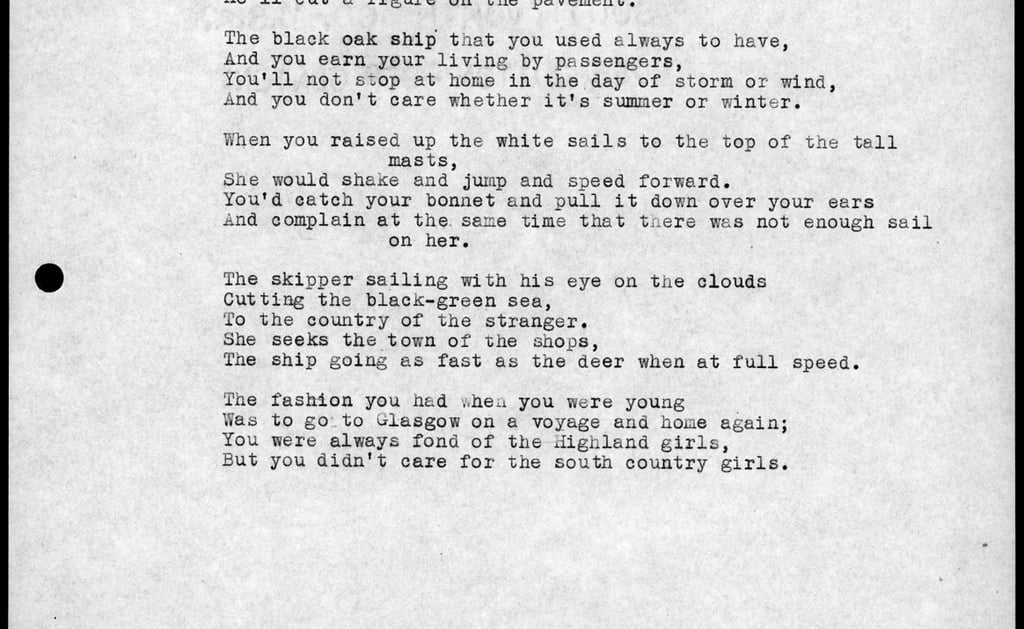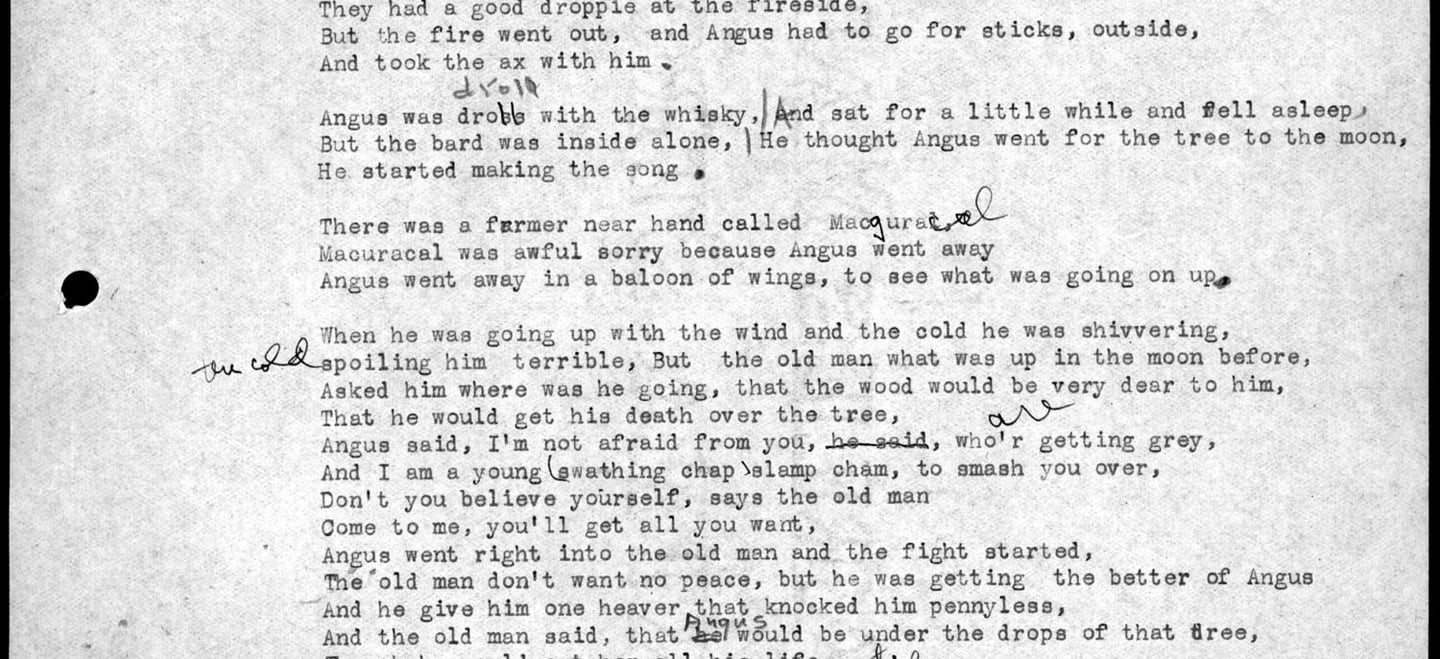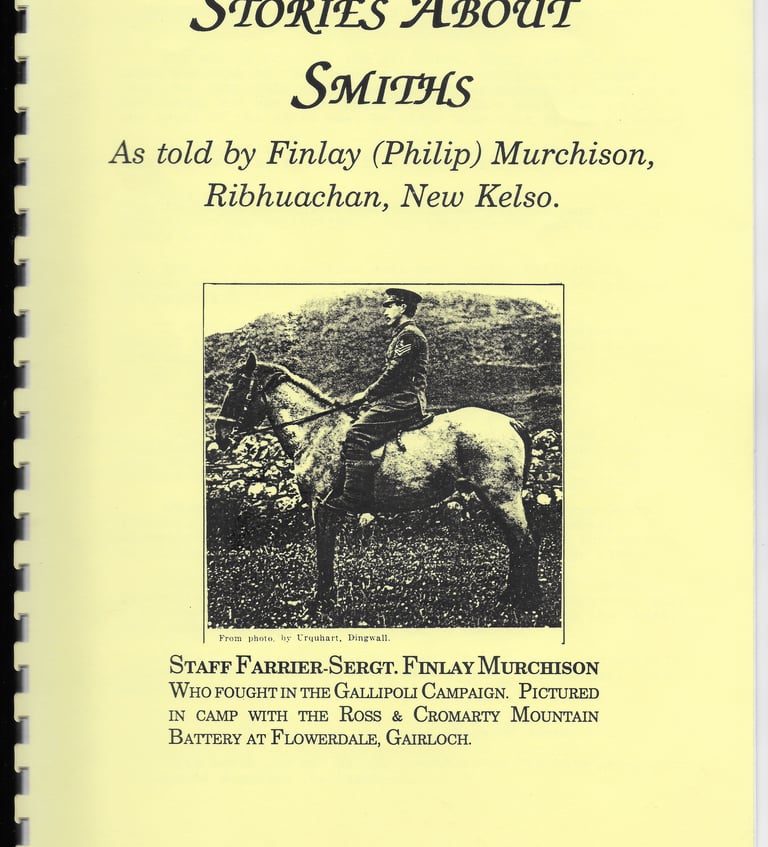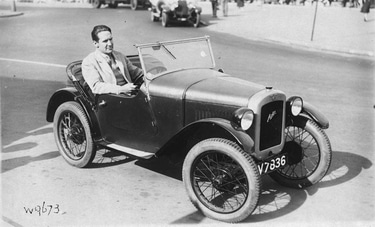In 1931 American song collector James Madison Carpenter came to Lochcarron, and recorded two singers. One was Finlay Finlayson, aged 77, the other Finlay Murchison. They both wrote down then translated Gaelic songs for Carpenter.
Finlay Murchison's address was Ribhuachan, Lochcarron. The latter address was the town smithy, and Murchison was ‘the last of the smiths’. The building is now the town heritage centre, on your right as you are driving into Lochcarron.
I am grateful to my informants, Helen I Murchison of Achintraid, Kishorn, and Morag Henriksen.
Helen said there are several members of the Murchison clan known to her, but no others are now living in the Strathcarron area. She could not immediately identify a direct family relationship between Finlay Murchison and herself. She then made local enquiries and was able to tell me the following.
' Finlay (Philip) Murchison never married and a quite remote connection owns the house now.
'Ribhachan Smithy and grounds were given to the Heritage Society, but it has since been taken over by the Lochcarron Development Co and today the Smithy is a pottery.'
Helen also said that the ‘History Of The Murchisons’ is given in the ‘Transactions Of The Gaelic Society’, Volumes 42-50. I mentioned to her my interest in Sir Roderick Impey Murchison, very influential 19th Century geologist who was born in Tarradale House near Muir of Ord. He was proud of his West Coast ancestry, and had commissioned the well-known Landseer painting ‘Rent Day In The Wilderness’ about Colonel Donald Murchison collecting the rents for his exiled clan chief after the 1715 Rising. Sir Roderick also commissioned the monument to Colonel Donald that is off the A87 near Kyle of Lochalsh. Helen knows of a family link to Sir Roderick.


Morag Henriksen kindly gave me the following fascinating account of Finlay Murchison and his songs.
'Finlay Murchison was the smith at Rhibhuachan, Lochcarron. He was known as Uncle Philip to the Murchisons in Moruisk, next door to the Lochcarron Schoolhouse where I grew up and to me too, because the Murchisons were more than neighbours when I was a child. They treated me like family.
'Philip used to ceilidh in our kitchen when I was very small (about 3). I remember hearing the magic tones of Morag the fiddle and coming in my nightie downstairs and through all the long dark scary passages, drawn to the music, and getting to sit on Philip's knee by the stove while he sang. I loved the fact that his fiddle had the same name as me and that he'd written a song about it. From that time I picked up the tunes and some of the words of "Morag the fiddle" and "Now then give them a volley" and "Maiden of Morven" (a Harold Boulton song – I learned this much later) and what he always called The Goodman Song, ie "' S iomadh fhein a shuibhal mi",Murdo Macrae's version of Seven Drunken Nights. As a result of that I called him Goodman for years till I grew up a bit and began calling him Uncle Philip like the young Murchisons.
'Philip was a farrier with the Ross Mountain Battery at Gallipoli. He wrote the Gallipoli song, "Now then, give them a volley. Up the gully we go." for the British Legion in Dingwall. We used to go to Rhibhuachan to call in at the smithy and go to the haymaking at his farm. A magic place for children.
'I remained lifelong friends with Malcolm and Mary Finlay and Flora Murchison. Malcolm died recently in Tasmania. He found the manuscript of the Morag the fiddle song in Philip's handwriting and sent it to me a few years ago. I had only ever known a few verses but Philip had written much more of it for Malcolm. I sang it and The Gallipoli song about The Ross Mountain Battery which Mary had given me to sing at a ceilidh in Plockton; I found "Maiden of Morven" in Songs of the North and I have the words of the Goodman Song too because I kept hearing it sung locally not just by Philip.
'I sang these four songs on to a CD and sent it as a gift to Malcolm and his family. I kept a copy too. Tom McKean of Aberdeen University put a letter in the West Highland Free Press in May 2010 asking for information about Murdo Macrae and Finlay Murchison further to studying the Carpenter recordings. I wrote to him then as I'm writing to you now. Since then, with the help of Mary Finlay Murchison, now in Edinburgh, I compiled a file on Philip, his songs and stories and have kept these songs going because I sing regularly every week in day care centres and residential homes; all through lockdown via Skype and Teams and now live again at Tigh na Drochaid Day Centre. I have no end of songs.'




Card images are used courtesy of the James Madison Carpenter Collection, American Folklife Center, Library of Congress.
